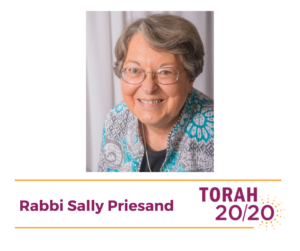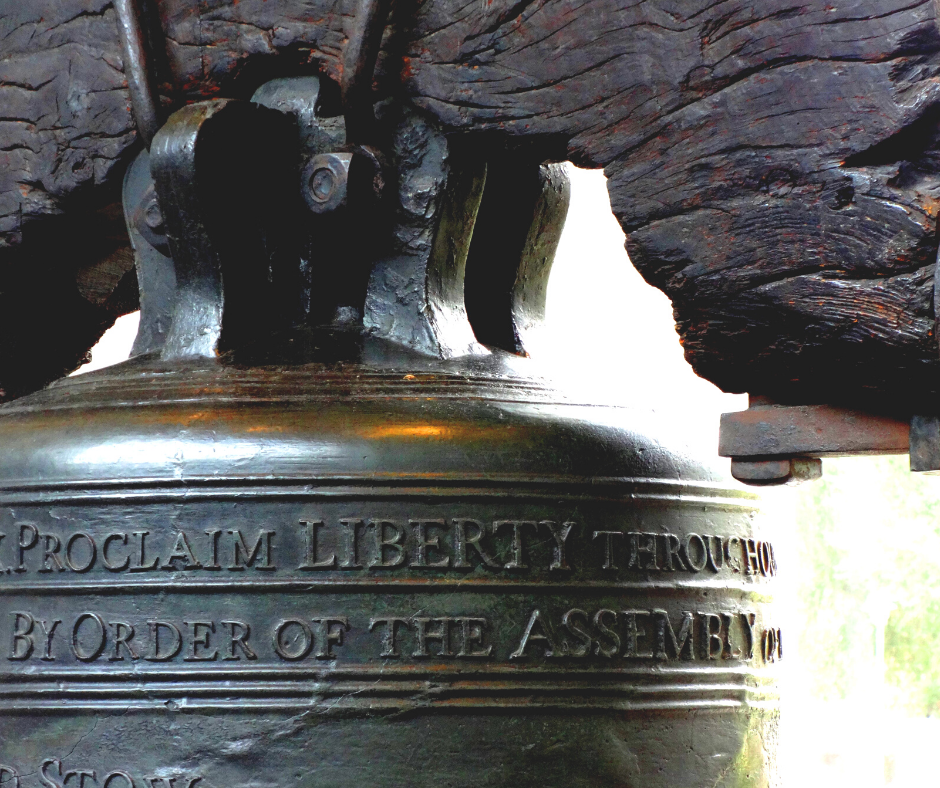A d’var Torah for Behar-Bechukotai from Rabbi Sally Priesand.
The first time I visited the National Museum of American Jewish History in Philadelphia, I was touched to discover that it was located near the Liberty Bell, knowing that our American forebears had chosen a verse from this week’s parshah to declare its meaning: “Proclaim liberty throughout the land unto all the inhabitants thereof” (Leviticus 25:10). I will admit not knowing much about the Liberty Bell itself. When and where was it made? What caused the crack? Why was this verse chosen?
According to the National Park Service, it was ordered in 1751 from the Whitechapel Foundry in London for the Pennsylvania State House, now called Independence Hall. The bell cracked on the very first test ring and had to be repaired by two metalworkers in Philadelphia before it could call lawmakers to their work and townspeople to hear the news. Nearly a century later, it cracked again, this time irreparably, which is why we have never had the privilege of hearing it ring.
The biblical verse was chosen by Isaac Norris, Speaker of the Pennsylvania Assembly, who wanted to honor the memory of William Penn and the 50th anniversary of his having granted religious liberty and political self-government to all the citizens of Pennsylvania. For Norris, this verse was appropriate because it was connected to the 50-year jubilee during which the people of Israel were commanded to free their slaves and return all property to the original owner.
Sign up to receive Torah 20/20 in your inbox each week.
Liberty is interwoven throughout our heritage, both Jewish and American, and I am drawn to “all the inhabitants.” Our battle with COVID-19 has shown that people of color are more affected than whites by financial and economic instability and by the virus itself. Our obsession with COVID-19, the fear and frustration it causes, sometimes makes us forget so many other causes that are important. There cannot be liberty “throughout the land” unless the right to vote is easily available to every citizen and gerrymandering is eliminated. This is an election year — perhaps the most significant one in our lifetime — and we cannot overlook the significance of ensuring that everyone has the ability to vote, whether in person or by mail, thereby fulfilling our most important obligation as American citizens. We may not be able to visit our elected officials right now to express our opinions, but we can certainly be in touch via technology or through good old-fashioned letters.
The Liberty Bell also became an important symbol when women were seeking the right to vote. In fact, the women’s suffrage movement created a “Justice Bell” that accompanied them to their rallies. Today, the Equal Rights Amendment has been reborn. In January, Virginia became the 38th state to ratify it, although the date for allowing it to become the 28th amendment to the U.S. Constitution has expired. In February, the House of Representatives passed a resolution to reintroduce it. The Senate has yet to discuss it. Justice Ruth Bader Ginsburg encourages its ratification, saying “Every constitution in the world written since the year 1950… has the equivalent of an equal rights amendment, and we don’t.”
Find more commentaries on Parshat Behar.
Living in New Jersey, I often take the Holland Tunnel when driving into New York. From the on-ramp, I can look out and see the Statue of Liberty, which I consider to be the Liberty Bell’s partner. It too has a Jewish connection since “The New Colossus” was written by Emma Lazarus. Her work as a champion for Jews fleeing Russia gives added meaning to the poem, reminding us that we too have a responsibility to make certain that America has a fair and just immigration policy. At this time of the COVID-19 crisis, let us not forget the migrant families forced to live in detention centers where there is no hope of social distancing.
Finally, Leviticus 25 takes us beyond the borders of our country. The sabbatical year (shmita) in which the land lies fallow and the jubilee year (yovel) in which property is returned to the original owner are reminders that the Earth belongs to God, and we are but caretakers and renters of the land. The COVID-19 virus has shown how our actions affect the environment, disregarding national boundaries. While we are quarantined and travel is restricted, the amount of pollution has decreased substantially. Thus, when we insist that our elected officials deal with the challenge of climate change, we are fulfilling a God-given responsibility.
May our efforts to spread liberty prove successful, as did those of Emma Lazarus, about whom it was said: “She gave the statue a human heart.”
Rabbi Sally J. Priesand is Rabbi Emerita of Monmouth Reform Temple in Tinton Falls, NJ and president of Interfaith Neighbors, a local organization seeking to feed the hungry and house the homeless. She was the first woman ordained as a rabbi in North America.

